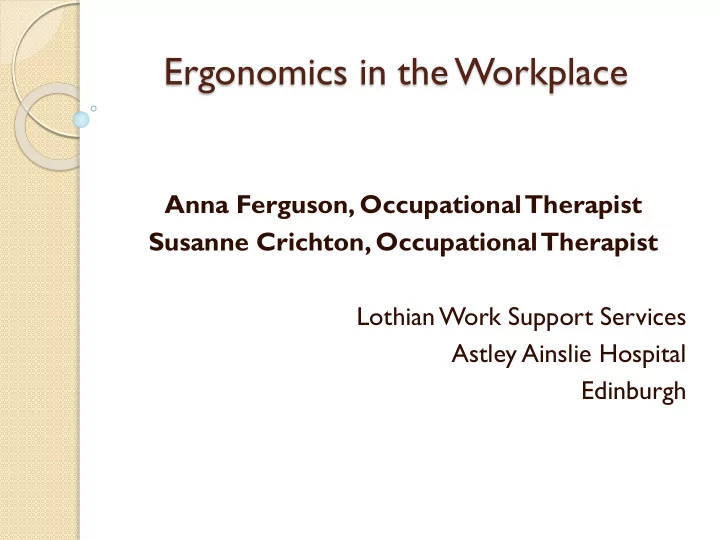

Ergonomics in the Workplace Anna Ferguson, Occupational Therapist Susanne Crichton, Occupational Therapist Lothian Work Support Services Astley Ainslie Hospital Edinburgh
What is Ergonomics ? The science of making things fit people. Ergonomics uses knowledge from the fields of anatomy, mechanics, physiology, and psychology to utilize human energy most effectively. Something that is ergonomic is designed for safe, comfortable, and efficient use. e.g. a computer keyboard with an ergonomic design is intended to help the user avoid carpal tunnel syndrome and wrist pain. William C Shiel, Medicine Net
What is good body mechanics? Body mechanics refers to the way you hold your body when you move around. Good body mechanics help you avoid muscle fatigue and injuries as you walk, bend over, lift objects, or perform other activities of daily living. Think of body mechanics as good posture in motion. Good posture places the least amount of stress possible on your muscles and ligaments when you sit still or move around.
Why so important? 469,000 workers suffering from work-related musculoskeletal disorders in UK* 35% of all work-related ill-health in UK was musculoskeletal disorders* 6.6 million working days lost due to work-related musculoskeletal disorders in UK* Impacts on productivity, service provision & colleagues *Labour Force Survey (LFS) 2017/18
Percentage of Work Related MSK Disorders reported to GP* * THOR-GP 2013-2015
Work Place Risk Factors Repetition ◦ Performing the same or similar motion Static Loading or Sustained Exertions ◦ Muscles hold body in single position for a long period of time Awkward Postures ◦ Postures that bend joints into positions that more likely to become injured in Mechanical Contact Stress ◦ Hard/sharp object pressing into soft tissue Force ◦ Tasks that require a moderate amount of force to be applied to complete
Key principles of risk assessment: Avoid Risk wherever possible Evaluate Risk that cannot be avoided Reduce risks to as low as reasonably practical levels
Awkward postures – bending at neck e.g. when using electronic devices or laboratory equipment can add up to 60lbs of pressure on your spine
Ergonomics Checklist Heavy, awkward or frequent lifting (refer to HSE Guidelines below)
Ergonomics Checklist Carrying, pushing and pulling – carrying heavy items over long distances, pushing or pulling with effort Repetitive motions – repeating the same movement with little or no change more than 2 hours a day Bending the wrists, when combined with hand force or repetitive movement Kneeling or squatting High hand force – gripping with the tips of the fingers gripping with the whole hand more than 2 hours a day Awkward Postures – e.g. Working with arms raised above the shoulder, or elbows above the shoulder, working with back bent in ‘C’ shape, twisting, bending at the neck
Who can help? Employer Occupational Health Service ◦ Usually access via HR or manager ◦ Some offer occupational therapy or physiotherapy assessment Lothian Work Support Services ◦ Particularly if small to medium size business (<250) ◦ 0131 537 9579 ◦ voc.rehab@nhslothian.scot.nhs.uk NHS Lothian Physiotherapy Service ◦ Self referral via NHS24 MSK Triage Service ◦ 0800 917 9390 between 0900-1700 Mon-Fri
Who can help? Healthy Working Lives ◦ Government funded, provides workplace health, safety and wellbeing information for employers. ◦ Free advice line 0800 019 2211 ◦ https://www.healthyworkinglives.scot/Pages/default.as px Institution of Occupational Safety and Health (IOSH) ◦ https://www.iosh.com/resources-and-research/our- resources/occupational-health- toolkit/musculoskeletal-disorders/ Health and Safety Executive (HSE) ◦ https://www.hse.gov.uk/
Any Questions? voc.rehab@nhslothian.scot.nhs.uk
Recommend
More recommend